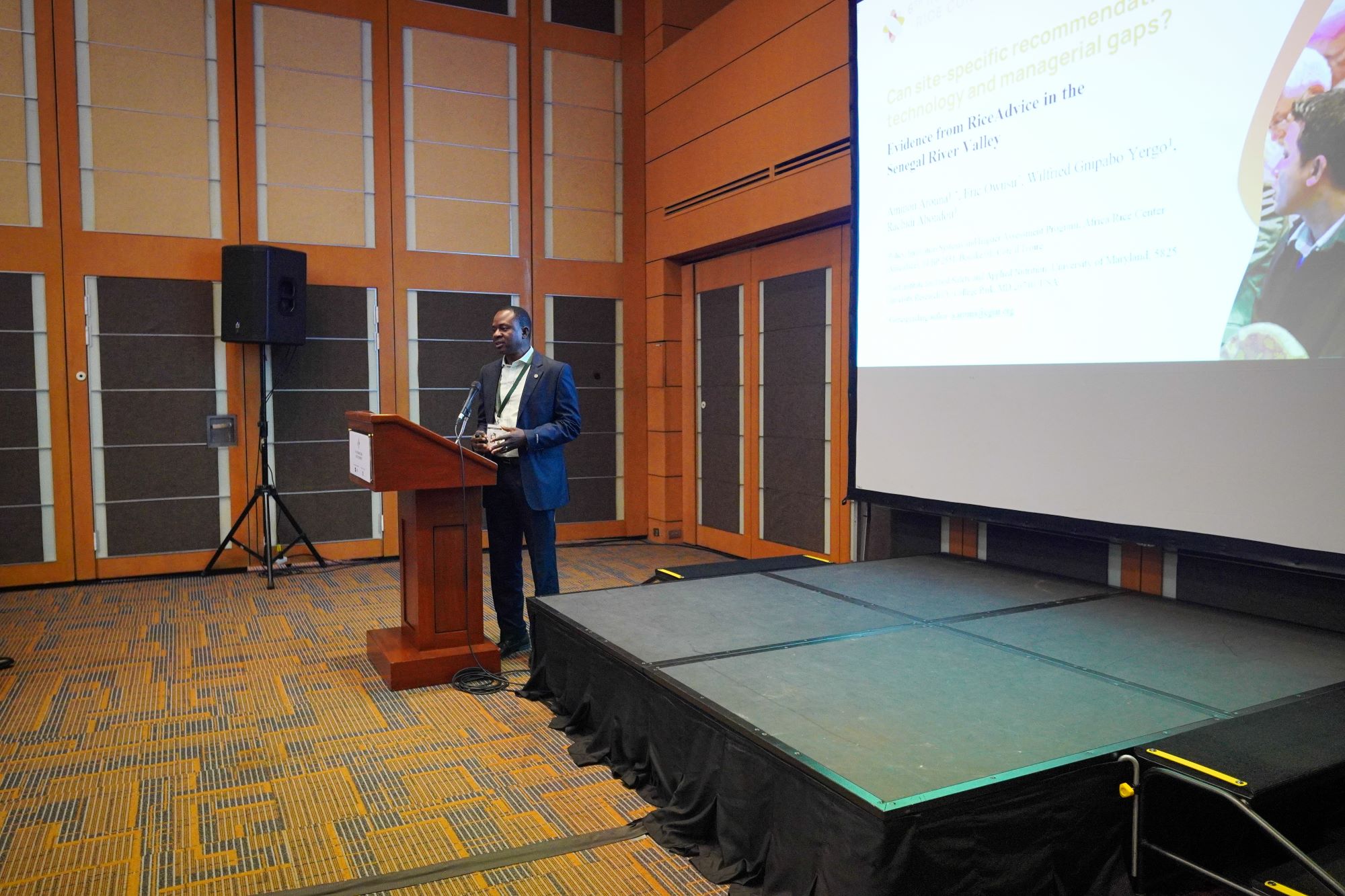Studies show rice breeding innovations and technologies have made positive impacts on Asian and African farmers

Manila, Philippines (27 October 2023) – Evidence of the positive impact of rice breeding innovations and technologies on the productivity, income, and resilience to climate change of Asian and African rice farmers was presented at the symposium titled Adoption and Impacts of rice innovations: What do we know so far?, organized by the Transformative Policies & Investments Unit of the International Rice Research Institute (IRRI) at the sidelines of the 6th International Rice Congress.
In 1966, IRRI introduced the high-yielding semi-dwarf rice variety IR8 in the Philippines and India. Dubbed the “Miracle Rice,” IR8 dramatically increased the yields of rice and played a significant part in the Green Revolution. IRRI has released hundreds of other varieties of rice since IR8 to keep rice production ahead of population growth.
What would have been the aftermath if the IRRI breeding program had not released new rice lines after IR8?

"Using the economic surplus framework, we found strong positive returns on IRRI and national partners’ investment in varietal improvement,” Rowell Dikitanan, an Agricultural Economist at IRRI, said during his presentation titled “Returns on investments in rice varietal development: Case of small and large economies”.
The major result of the financial analysis showed positive net present value (NPV) in Bangladesh, Nepal, Cambodia, Indonesia, Thailand, and the Philippines, with Bangladesh having the highest NPV of around USD 34 billion.
In terms of the benefit-cost ratio, it also showed favorable results among the countries assessed. In Indonesia, for instance, for every one-dollar investment, there is a gross return of USD 283, indicating that the benefits of the investment outweigh the costs.
“We now have evidence in Asia and plan to expand the analysis to African countries,” said Mr. Dikitanan. “The results will be useful in justifying continuous investment in rice research.”

“As public funds are becoming scarcer, providing evidence of adoption and impacts of rice innovations is important to justify investments in rice R&D,” added Dr. Valerien Pede, senior scientist-agricultural economics and head of IRRI’s Transformative Policies & Investments Unit.
“IRRI has done a phenomenal job in shielding the Philippine rice industry from having to import more rice from its breeding and genetics program,” said Lawton Lanier Nalley, a professor at the University of Arkansas, “For instance, the 2021 domestic rice prices in the Philippines would have been 6.1% higher.”

Dr. Nalley’s presentation titled “Evaluating the Global Impact of IRRI’s Breeding Innovations” revealed that, globally, the export price of rice would increase by 0.4%, rice trade would increase by 0.9%, and rice consumption would decrease by 0.1%.
In Bangladesh, farmers who adopted stress-tolerant rice varieties (STRVs) have higher yields than non-adopters after flooding events, according to Dr. Jeffrey Michler, an associate professor at the University of Arizona, who conducted a geospatial impact evaluation of STRVs in the country. During flood-free seasons, STRVS did not produce lower yields.
Aminou Arouna, program leader and impact assessment economist at Africa Rice Center, presented a study on how site-specific recommendations can bridge technology and managerial gaps. RiceAdvice, a mobile application that provides rice farmers with personalized recommendations on nutrient management, improved the technical efficiency of farmers in the Senegal River Valley, according to Dr. Arouna.

Dr. Kyle Emerick, an associate professor at Tufts University, examined the role of private input suppliers as information agents for the adoption of agricultural technologies. The findings of his study indicated that engaging private agricultural dealers increased technology adoption compared to traditional government extension methods.
The adoption of Green Super Rice varieties has benefitted millions of resource-limited rice farmers through higher productivity and income while reducing their environmental impact, according to Huaiyu Wang from the Beijing Institute of Technology. Dr. Wang said the global adoption of Green Super Rice has the potential to transform rice agriculture.
Robert Andrade from the Alliance Bioversity and CIAT presented the significance of rice production in mitigating climate change and strengthening public-private alliances in rice research and scaling up. Such alliances have the potential to drive progress in rice research and innovation, according to him.
"It’s not just a matter of having these technologies available,” said Dr. Andrade. “We also need to see how these technologies are disseminated and get to the farmers. How we view evidence that can be understandable to others to make better decisions and be encouraged to adopt its effects is important.”